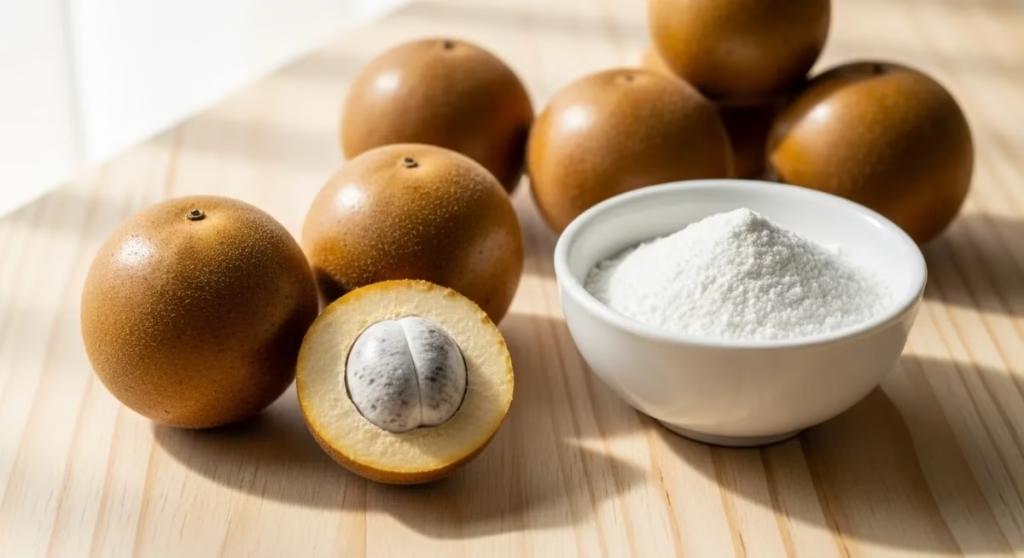Introduction
As people around the world search for healthier sugar alternatives, one natural option is attracting attention: monk fruit. This small melon from Asia, also known as luo han guo, has been part of traditional medicine for centuries and is now recognized as a modern sugar substitute.
Unlike table sugar, monk fruit extract delivers intense sweetness without calories or carbohydrates. That makes it appealing for individuals with diabetes, those following keto diets, and anyone who wants to cut down on sugar. In this article, we’ll explore everything you need to know—from its health benefits and nutrition to how you can use it in daily life.
What Exactly is Monk Fruit?
Monk fruit is a small round gourd grown mainly in southern China and Thailand. It earned its name because Buddhist monks were among the first to cultivate it. The fresh fruit itself is rarely eaten since it spoils quickly, but it can be dried or processed into a concentrated extract.
Its sweetness comes from natural compounds called mogrosides, which are 150–200 times sweeter than sugar yet contain zero calories. This makes monk fruit extract an ideal sugar substitute in beverages, baked goods, and even packaged foods.
Nutrition Overview
Pure monk fruit extract contains no calories, fat, or carbohydrates. It also has a glycemic index of zero, meaning it won’t raise blood sugar or insulin levels.
| Nutrient | Monk Fruit Extract |
|---|---|
| Calories | 0 |
| Carbohydrates | 0 g |
| Sugar | 0 g |
| Fat | 0 g |
| Protein | 0 g |
| Glycemic Index | 0 |
Key Health Benefits
1. Weight-Friendly Sweetness
Since it contains no calories, monk fruit can support weight-loss goals. Using it instead of sugar helps lower total daily calorie intake without giving up sweetness.
2. Safe for Blood Sugar Control
This natural sweetener has no impact on blood glucose, making it suitable for people with type 2 diabetes. Some studies also suggest that mogrosides may enhance insulin response.
3. Antioxidant Support
Mogrosides act as antioxidants, helping neutralize free radicals that contribute to aging and chronic diseases.
4. Anti-Inflammatory Properties
Traditional Chinese medicine has long used dried monk fruit tea to soothe sore throats and inflammation. Modern research also points to anti-inflammatory benefits.
5. Heart Health Potential
Replacing sugar with this plant-derived sweetener may reduce risks linked to high blood pressure, obesity, and cardiovascular disease.
How to Use Monk Fruit in Daily Life
This zero-calorie sweetener can replace sugar in most recipes.
- Hot drinks: Tea, coffee, herbal infusions.
- Cold beverages: Smoothies, lemon water, iced tea.
- Baking: Cakes, cookies, brownies (with adjustments for texture).
- Cooking: Sauces, glazes, salad dressings.
- Packaged foods: Sugar-free ice cream, protein bars, low-carb desserts.
Because monk fruit is far sweeter than sugar, very small amounts are needed. To make it easier, some products are blended with erythritol or allulose for balance.
Comparing Sweeteners
| Feature | Monk Fruit | Stevia | Sugar | Aspartame |
|---|---|---|---|---|
| Calories | 0 | 0 | 16/tsp | 0 |
| Sweetness Level | 150–200x sugar | 200–300x sugar | 1x | 200x sugar |
| Glycemic Index | 0 | 0 | 65 | 0 |
| Taste | Mild, fruity | Bitter aftertaste | Sweet | Artificial |
| Natural/Artificial | Natural | Natural | Natural | Artificial |
👉 Many people prefer monk fruit over stevia or artificial options because of its clean, sugar-like taste.
Possible Side Effects
Monk fruit is generally considered safe by the FDA. Still, a few points to consider:
- Allergic Reactions: Rare, but possible in people allergic to gourds like cucumbers or pumpkins.
- Digestive Concerns: Some blended products contain sugar alcohols, which may cause bloating.
- Taste Differences: While close to sugar, some notice a slight fruity aftertaste.
Buying and Storing
When purchasing monk fruit sweetener, check the label—many products contain fillers like dextrose or erythritol. For the purest form, look for 100% monk fruit extract.
- Store in a cool, dry place.
- Keep sealed in an airtight container.
- Shelf life: up to 2 years for pure extract.
Fits into Many Diets
This sweetener works well with various lifestyles:
- Keto diet – zero carbs.
- Diabetic diets – no effect on glucose.
- Paleo-friendly – naturally derived.
- Weight management – supports calorie reduction.
Frequently Asked Questions
1. Is monk fruit better than sugar?
Yes—it’s calorie-free and does not spike blood sugar, making it a healthier option.
2. Can children use it?
Yes, but introduce gradually to avoid sensitivity to new sweeteners.
3. Does it taste exactly like sugar?
It’s very close, though some people detect a mild fruity undertone.
4. Can I use it every day?
Yes, daily use is safe and does not cause harmful effects.
5. Is it safe during pregnancy?
Generally safe, but it’s always best to consult a doctor.
Conclusion
Monk fruit has evolved from a traditional Chinese remedy into one of today’s most trusted natural sweeteners. It delivers sweetness without calories, does not affect blood sugar, and contains antioxidants that support overall health.
Whether you’re managing diabetes, following keto, or just trying to cut back on sugar, monk fruit is a safe and versatile choice. From your morning coffee to baked goods, it provides a clean and natural way to enjoy sweetness without the drawbacks of sugar.







